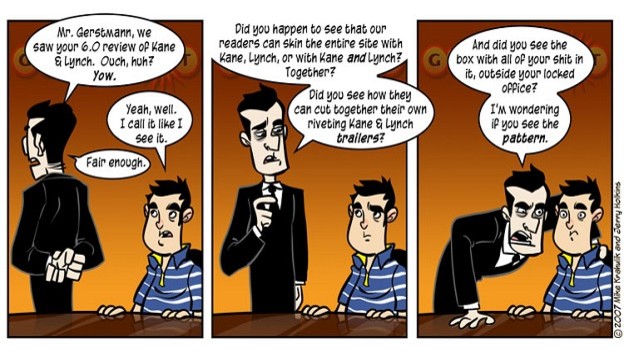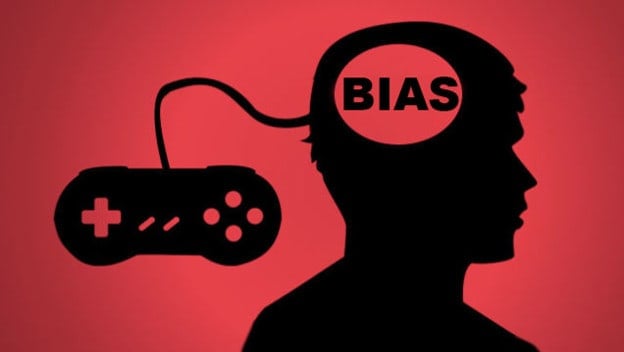We all know there’s been a lot of talk about ethics in video game journalism over the past couple years. However, journalism as an entire field isn’t entirely ethical, often despite the best efforts of writers. It is plagued by numerous forms of bias that are nearly inescapable, especially when outlets are funded by advertisers. Readers aren’t the customers in most cases, advertisers are. Readers are the resource publishers are providing to the advertisers. In such a formula, objectivity is further complicated. It isn’t profitable to ignore the biases of your readership, and it may be impossible for an author to totally ignore his or her own biases. If bias is truly unavoidable, and perhaps even forgivable in some cases, then maybe the best thing we can do is educate ourselves on the various known biases. Here are some of the most prominent examples affecting video game journalism.
Commercial Bias
Commercial bias has a huge presence in almost any form of journalism that gets its revenue from advertisements. It is the reason for clickbait articles and flame wars. It is the reason that an outlet might steer towards stories that are novel but, overall, without substance or impact. It is the reason valence may be the core objective of a piece; if an article can create an emotional reaction, particularly of anger or sadness, then it is far more likely to be shared and encourage discussion.
The reason publishers take these angles is so they can report higher readership figures to advertisers.
Expediency Bias
Another bias seen in games journalism is the expediency bias. As the name entails, this particular bias centers around getting the news out fast. Partially motivated by the commercial bias, sites want to be one of the first of their competitors to report on a story before coverage on that topic is saturated. The existence of N4G and other aggregate sites that only allow for one instance of a story on their site only exacerbates the problem. Being early generates hits which generates revenue.
Being late to the game is also bad in terms of site loyalty. If readers aren’t getting their news in a timely manner, they might go elsewhere.
This bias accounts for poor reporting and a lack of fact checking and does significant damage to the field. There are countless examples of unsubstantiated rumors spreading as fact throughout gaming sites.
Fairness Bias
A high standard for objectivity can motivate a lot of reporters to make sure both sides of a debate are evenly represented. They will allot a portion of their article to a conflicting quote, or a publication may try to cover both sides of a debate equally. This can sometimes create the illusion that the industry is pretty evenly split on an issue. The best example of this actually comes from outside of video games journalism, but it illustrates the problem so well that one should be able to recognize fairness bias when they see it from now on.
Outlets in other styles of journalism like to report on climate change as though it’s a matter of opinion and any stance on the topic is equally supported. In their reports, one scientist will state its existence while another will deny it. This, obviously, misrepresents the fact that an overwhelming majority of scientists are of the belief that climate change exists.
With the fairness bias, an outlet trying too hard to appear objective will end up misrepresenting or distorting data. They may also omit stories in an attempt to “prove” that they don’t favor one company over another if coverage has felt unbalanced. Sometimes, though, reality dictates that one company should be covered more at a given time, so this bias can lead to misrepresentation.
Narrative Bias
Stories have a beginning, middle and end. Often, coverage can be told like a story but, in the real world, stories rarely come to a conclusion. Writers like to provide this coverage in this style, regardless, and what ultimately ends up happening is that the coverage loses some realism. The stage is set and the real life people involved become characters, sometimes larger than life in their depiction. Details are chosen based on how they fit into a particular narrative.
Not only can this method of reporting, like the fairness bias, distort reality, but they can prolong a controversy. It’s effective, though, in that readers keep coming back for more as though they were catching up on episodes of their favorite television drama.
Access Bias
Reporters are worth very little without a scoop. They get their information from the source but that information is so often locked down and selectively revealed that journalists are often are forced to work as cogs in a marketing machine. This bias causes some of the least ethical practices in video game journalism.
Writers get close to their sources. They’re treated to free stuff and, sometimes develop friendships with the companies they’re covering. Even when that isn’t the case, they still are limited on what they can report or else they risk losing all access to a particular source of information. A blacklisted reporter isn’t of much use to anyone, and we see this in all forms of press (especially industry and political press), not just game journalism.

Now, a bias isn’t necessarily a bad thing and a reporter isn’t necessarily misleading their readers on purpose when they have a bias. Almost all things you read in the media should be taken with a grain of salt. Hopefully this article will help provide you with said “grain of salt.” If a reader can figure out where a writer is coming from and account for any bias that may be present, then they can more accurately discern what information in the news is useful to them as a consumer.
